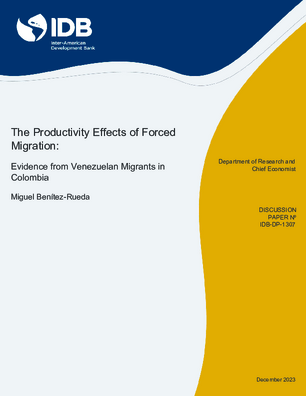The Productivity Effects of Forced Migration: Evidence from Venezuelan Migrants in Colombia
Date
Dec 2023
Labor-supply shocks resulting from forced migrations alter skills availability in host economies and influence firms' incentives towards formal and informal hiring, potentially affecting productivity. This paper examines the productivity effects of forced migration, using the Venezuelan exodus to Colombia as a case study. I employ a continuous difference-in-differences empirical strategy, leveraging the timing of the border reopening between Colombia and Venezuela as a source of exogenous variation. Results reveal that a one-percentage-point increase in the migration share at the industry level increased labor productivity by 7.6%. This effect was attributable to a decrease in employment and hours worked rather than an increase in output and was driven by the higher skill set of migrants compared to natives. Combined, these results suggest that productivity gains were derived from the replacement of less-educated natives by higher-skilled migrants. Finally, I show that productivity gains were somewhat counteracted by barriers to formality faced by Venezuelans.




